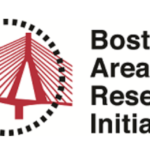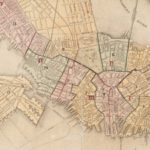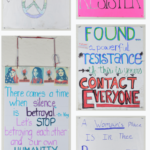The Boston Research Center is part of a vibrant research and teaching community at Northeastern. Community-engaged projects and initiatives across the university focus on Boston through many different lenses, including urban resilience, Black history, big data, arts activism, and more.
Boston Area Research Initiative

The Boston Area Research Initiative seeks to spur original, cutting-edge research in the greater Boston area that both advances urban scholarship and improves public policy and practice. Central to this mission is an overarching effort to forge active and mutually beneficial relationships between the region’s researchers, policymakers, practitioners, and civic leaders. BARI supports research-policy collaborations, BARI projects provide insights into daily life in greater Boston, help policymakers and practitioners to better serve their constituencies, and increase our understanding of human behavior. BARI’s Boston Data Portal provides a space where researchers, policymakers, and community members can map and download data generated by BARI projects.
Global Resilience Institute

The Global Resilience Institute is a collaborative research and educational community that shares a common commitment to work in close partnership with industry and public entities in developing and deploying practical tools, applications, and skills that bolster the resilience of individuals, communities, critical systems and networks, and societies. Among the GRI’s initiatives in progress is a Critical Infrastructure Network (CInet) to provide a separate, secure communications network for critical infrastructure owners and operators. Working with partners in the private sector, the Federal government, and state and local agencies, GRI is engaging in a feasibility study in the metro Boston Area and has begun preliminary technical design work. The GRI also has a seed grant program that supports projects, such as the Center on Crime and Community Resilience, that will collaborate with the City of Boston to understand and address persistent public safety problems.
Dukakis Center for Urban and Regional Policy
The Dukakis Center for Urban and Regional Policy conducts interdisciplinary research, in collaboration with civic leaders and scholars both within and beyond Northeastern University, to identify and implement real solutions to the critical challenges facing urban areas throughout Greater Boston, the Commonwealth, and the nation. Founded in 1999 as the Center for Urban and Regional Policy or CURP, the Dukakis Center is equally committed to producing state-of-the-art applied research and to implementing effective policies and practices based on that research. The Dukakis Center’s current projects include the Boston Youth Credit Building Initiative and a “Multi-Year Evaluation of the Boston Youth Summer Employment Program and Features to Reduce Inequality across Groups.”
School of Criminology and Criminal Justice
Northeastern faculty in the School of Criminology and Criminal Justice are involved in a number of research projects related to Boston, including an evaluation of the Boston Police Department’s body-worn camera program, conducted by Anthony A. Braga, Lisa Barao, Jack McDevitt, and Greg Zimmerman. This is one of several collaborations between BPD and faculty in criminal justice; another is a recent study published by Braga with Philip Cook on gun violence and firearm caliber. Criminal justice faculty also contribute to Northeastern’s Institute on Race and Justice, an interdisciplinary academic center, involving the College of Social Sciences and Humanities, School of Criminology and Criminal Justice, Department of Cultures, Societies and Global Studies, Department of Sociology & Anthropology, and the School of Law. The IRJ has a number of projects related to criminal justice and to education.
Early Black Boston Digital Almanac
 Nicole Aljoe, project lead for the Early Black Boston Digital Almanac, is substantively engaged with the Boston community, particularly with high school students. Aljoe, along with Everyday Boston and ENGAGE, was awarded a Mass Humanities grant for a project called “Stories of Our Streets” as part of the Engaging New Audiences in the Humanities initiative. The program will combine literary discussion, archival research, and community interviews in order for young people in Boston to learn and write about Boston as a city, while focusing on the history and community of an individual street. Additionally, a new book, We the Students, has also recently been published by 826 Boston. The collection was written by O’Bryant High School history students who were tutored by students in Aljoe’s “Boston in Literature” class. Aljoe also wrote the Foreword and she recently received a 2017-2018 Course-Community Collaboration Award for her work with 826 Boston.
Nicole Aljoe, project lead for the Early Black Boston Digital Almanac, is substantively engaged with the Boston community, particularly with high school students. Aljoe, along with Everyday Boston and ENGAGE, was awarded a Mass Humanities grant for a project called “Stories of Our Streets” as part of the Engaging New Audiences in the Humanities initiative. The program will combine literary discussion, archival research, and community interviews in order for young people in Boston to learn and write about Boston as a city, while focusing on the history and community of an individual street. Additionally, a new book, We the Students, has also recently been published by 826 Boston. The collection was written by O’Bryant High School history students who were tutored by students in Aljoe’s “Boston in Literature” class. Aljoe also wrote the Foreword and she recently received a 2017-2018 Course-Community Collaboration Award for her work with 826 Boston.
Our Marathon

Our Marathon: The Boston Bombing Digital Archive is a crowdsourced archive of pictures, videos, stories, and social media related to the Boston Marathon; the bombing on April 15, 2013; the subsequent search, capture, and trial of the individuals who planted the bombs; and the city’s healing process. The archive serves as a long-term memorial, preserving these records for students and researchers, providing future historians with invaluable, local windows into an important national event. The project was originally founded in April 2013 by faculty and students affiliated with the NULab for Texts, Maps, and Networks in the College of Social Sciences and Humanities, and since September 2014 the Digital Scholarship Group at Northeastern University Libraries has managed the site and its long-term migration and preservation.
Art of the March
 The Art of the March project is an online archive and interactive presentation of protest signs and posters collected in the aftermath of the historic Boston Women’s March on January 21, 2017. Its website contains digital images of over 6000 signs placed by protesters on the iron fence of the Boston Commons old Central Burying Grounds and along its perimeter as the march ended. The project is supported by Northeastern’s College of Arts, Media and Design, the Northeastern University Libraries, the NULab for Texts, Maps, and Networks, and the Department of Communication Studies at Concordia University.
The Art of the March project is an online archive and interactive presentation of protest signs and posters collected in the aftermath of the historic Boston Women’s March on January 21, 2017. Its website contains digital images of over 6000 signs placed by protesters on the iron fence of the Boston Commons old Central Burying Grounds and along its perimeter as the march ended. The project is supported by Northeastern’s College of Arts, Media and Design, the Northeastern University Libraries, the NULab for Texts, Maps, and Networks, and the Department of Communication Studies at Concordia University.
NULab for Texts, Maps, and Networks
Faculty at Northeastern’s NULab for Texts, Maps, and Networks are engaged in a number of research projects focused on the Boston area, including several of the BRC’s prototypes for 2018: the Birth of Boston historical atlas project, the Early Black Boston Digital Almanac collection of archival exhibits showing the contributions of black individuals to Boston’s history, the Diversity Explorer interactive visualization, and the Mission Hill 100 interview series. The NULab has also supported several other Boston-related research projects, including Art of the March, Our Marathon, and the Global Ranking of Cities by Accessibility to Services project, which includes an interactive visualization of accessibility in Boston.
at Northeastern’s NULab for Texts, Maps, and Networks are engaged in a number of research projects focused on the Boston area, including several of the BRC’s prototypes for 2018: the Birth of Boston historical atlas project, the Early Black Boston Digital Almanac collection of archival exhibits showing the contributions of black individuals to Boston’s history, the Diversity Explorer interactive visualization, and the Mission Hill 100 interview series. The NULab has also supported several other Boston-related research projects, including Art of the March, Our Marathon, and the Global Ranking of Cities by Accessibility to Services project, which includes an interactive visualization of accessibility in Boston.
CERES Publisher
The Northeastern University Libraries Digital Scholarship Group‘s CERES Publisher is a publication platform that supports customizable exhibits with items stored securely in the library’s Digital Repository Service. Several projects published through CERES relate to Boston, including: Boston Public Schools Desegregation, Boston’s Racial Equity History Project, Boston’s Latino/a Community History, Freedom House Photographs, and the Lower Roxbury Black History Project.
